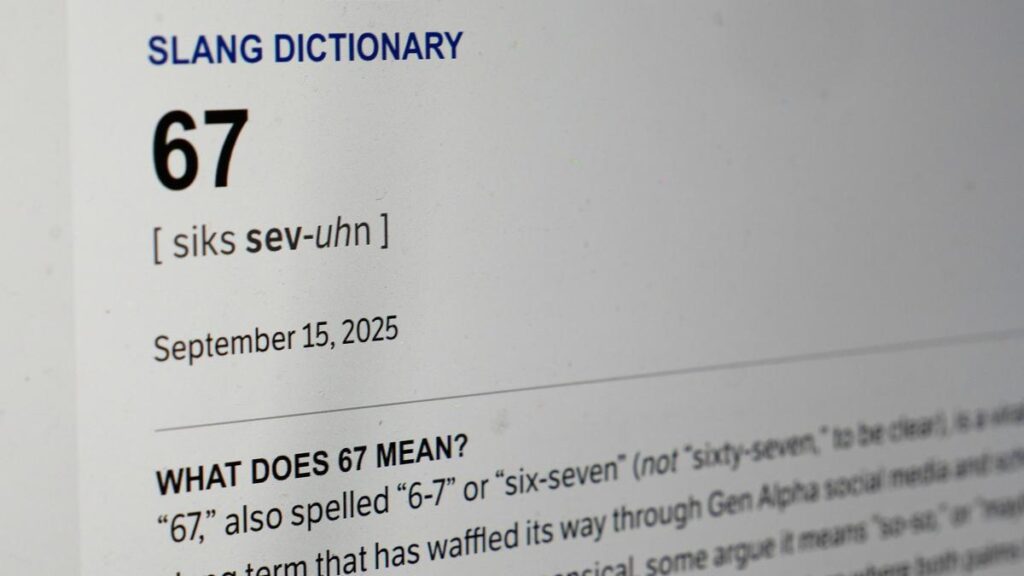
This Dictionary.com page shows the newest word of the year "6-7" on a computer screen, Thursday, Oct. 30, 2025, in Chicago. (AP Photo/Kiichiro Sato)
Every year, Dictionary.com’s Word of the Year serves as a linguistic snapshot, encapsulating the slang, memes, and cultural shifts that have defined the past 12 months. For 2025, the honor goes to something that defies traditional definitions: 6-7.
Yes, 6-7—two simple numbers that have somehow become a generational divide, a TikTok sensation, and now, the year’s most talked-about expression. Parents are left bewildered, Gen Alpha is reveling in their newfound cultural currency, and linguists are scratching their heads.
The Rise of 6-7: A Cultural Phenomenon
To select the Word of the Year, Dictionary.com’s lexicographers meticulously analyzed social media trends, headlines, and search data. Searches for 6-7 skyrocketed in mid-2025, increasing sixfold by June. In contrast, searches for other numbers remained flat, highlighting the unique appeal—or peculiarity—of 6-7.
The term first gained traction in rapper Skrilla’s viral track “Doot Doot (6-7)” before taking TikTok by storm. Clips featuring basketball players chanting “six-seven” and the emergence of a child dubbed the 67 Kid solidified its status as the year’s biggest linguistic meme. Teachers even began exchanging strategies on how to curb its usage among students.
Interestingly, it can appear as “6 7,” “six-seven,” or “6-7,” but uttering “sixty-seven” is a surefire way to reveal oneself as an out-of-touch adult.
The Elusive Meaning of 6-7
What does 6-7 mean? That’s the intriguing part: no one truly knows. Some speculate it signifies “so-so” or “maybe,” often accompanied by a signature hand gesture, palms up, alternating like a human scale. Others use it as a universal response, a playful means to confound authority figures. Ask a teenager how school was, and you might hear: “6-7.”
It’s nonsensical, yet that’s precisely why it resonates. It embodies an internet era characterized by irony, in-jokes, and endless scrolling. As Dictionary.com eloquently puts it, 6-7 “demonstrates the speed at which a new word can rocket around the world as a rising generation enters the global conversation.”
Other Words That Defined 2025
While 6-7 took the spotlight, several other contenders captured the digital and political mood of the year:
- Agentic: Once an academic term for human agency, now used to describe AI that acts autonomously, reflecting societal concerns about self-directed technology.
- Aura farming: The act of curating one’s energy or vibe online, popularized by the viral “boat kid” meme.
- Broligarchy: A blend of “bro” and “oligarchy,” describing the tech-bro elite orbiting power in 2025.
- Clanker: A snarky label for AI systems or chatbots, repurposed from sci-fi slang.
- Dynamite emoji: Rebranded by fans as “T’n’T,” shorthand for Taylor Swift and Travis Kelce.
- Gen Z stare: The blank, unreadable look that became a meme and a cultural talking point.
- Overtourism: The resurgence of travel crowds straining destinations like Venice and Mount Fuji.
- Tradwife: A revived term for the “traditional wife” aesthetic, sparking fresh debate about gender and domesticity.
The Language of Now
Dictionary.com emphasizes that its Word of the Year is not merely about popularity but reflection. “Language doesn’t just describe culture; it drives it,” the site’s editors explained. “When we choose a Word of the Year, we’re capturing how people express who they are and what matters to them.”
In 2025, that expression is unmistakably clear—even if it makes no logical sense. The selection of 6-7 as the Word of the Year underscores the evolving nature of communication in an era where digital culture and linguistic creativity intersect in unprecedented ways.
As we move forward, the impact of such linguistic phenomena on communication and cultural identity will undoubtedly continue to intrigue both linguists and the general public alike.





